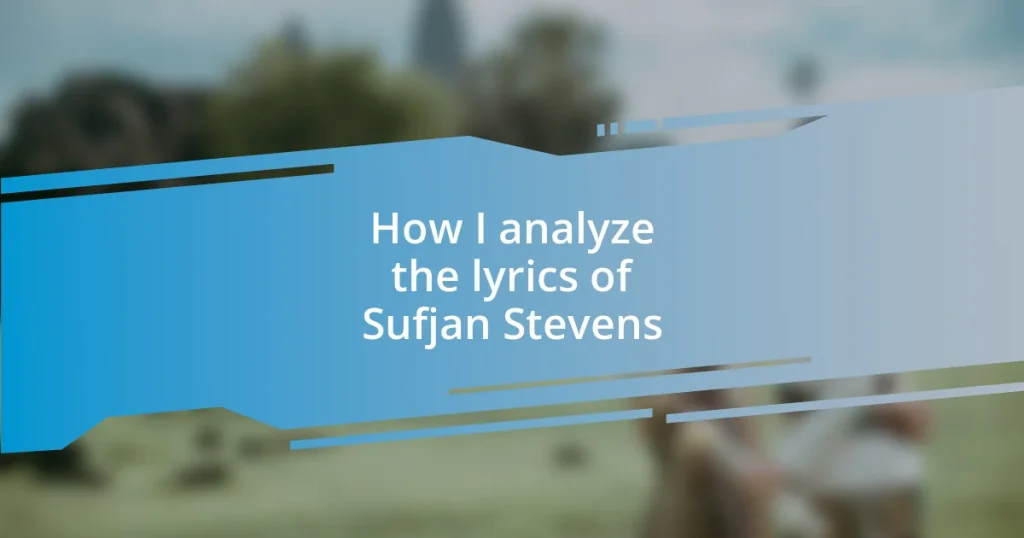Key takeaways:
- Sufjan Stevens intertwines personal narratives with broader societal themes, evoking deep emotional experiences through poetic lyrics and varied musical styles.
- His lyrics often explore complex themes like identity, loss, spirituality, and societal issues, drawing listeners into both personal and collective reflections.
- The emotional depth of his songs is enhanced by intricate song structures, vivid imagery, and cultural references, inviting listeners to connect their own experiences with his storytelling.

Understand Sufjan Stevens style
Sufjan Stevens has a unique ability to weave personal narratives with broader societal themes, creating a tapestry of sound and emotion that resonates deeply. I remember the first time I really listened to “Casimir Pulaski Day.” The lyrics painted such a vivid picture of loss and longing that it felt like he was sharing a piece of his heart with each listener. Doesn’t it move you when an artist can so skillfully blend their own experiences with themes that feel universally relatable?
In many of his songs, his clear yet poetic language serves as both an invitation and a challenge to engage with complex emotions. For instance, when I came across his track “Fourth of July,” the imagery of loss struck me profoundly. It’s as if he’s asking us to confront our own mortality while simultaneously celebrating life. This depth makes Stevens’ work not merely songs, but emotional experiences that linger long after the last note fades.
Moreover, his eclectic musical style often shifts between folk, orchestral, and even electronic elements, which I find enhances the storytelling aspect of his lyrics. This blend not only showcases his versatility but also reflects the complexity of the human experience. How can one genre fully capture the whirlwind of emotions we go through? In Stevens’ world, it feels like he’s saying that all these forms are necessary to encapsulate the intricacies of our lives.

Identify key themes in lyrics
Sufjan Stevens often explores themes of identity, loss, and spirituality in his lyrics. When I first listened to “John Wayne Gacy, Jr.,” I was struck by how he navigates the tension between darkness and the search for redemption. His ability to draw parallels between personal struggles and historical tragedies forces me to reflect on the nature of humanity itself. What do we learn about ourselves when faced with the shadows of our past?
In “Illinois,” he vividly portrays the beauty and sorrow of everyday life, capturing moments that might otherwise go unnoticed. I remember feeling an overwhelming sense of nostalgia when I heard “Romulus.” The themes of family and memory resonated so deeply that it made me reflect on my own childhood. Isn’t it fascinating how he can evoke such powerful emotions simply through the lens of place and time?
Furthermore, Stevens often uses storytelling to address social and political issues, weaving them seamlessly into his personal narratives. This fluidity allows listeners to connect on multiple levels. For example, “The Age of Adz” takes an intricate look at modernity and mental health, provoking thoughts about our place in an ever-evolving society. I find myself contemplating how these songs challenge us to confront our own realities.
| Theme | Example Lyrics |
|---|---|
| Identity | “John Wayne Gacy, Jr.” – Exploring the duality of humanity |
| Loss | “Fourth of July” – Reflecting on grief and remembrance |
| Spirituality | “Casimir Pulaski Day” – Merging personal narratives with faith |

Break down song structures
Understanding Sufjan Stevens’ song structures is essential for unraveling the emotional depth in his music. One thing I’ve noticed is how his arrangements often mirror the lyrical journey he takes us on. For example, the gentle build-up in “Chicago” captures a feeling of anticipation, leading to a cathartic release that perfectly aligns with the lyrics about hope and change. It’s like he’s creating a rollercoaster of sound that reflects the emotional highs and lows expressed in his words.
When breaking down his song structures, consider these elements:
- Verse and Chorus Dynamics: Many of his tracks utilize contrasting verses and choruses to emphasize lyrical themes.
- Bridge Variations: I find the bridges often serve as emotional pivots, allowing for reflection before returning to the main theme.
- Instrumentation Layers: The layering of instrumentation, especially in songs like “Death with Dignity,” adds depth, creating an atmosphere that enhances storytelling.
- Repetitive Motifs: Stevens frequently revisits musical motifs throughout a song to underscore the poignancy of his narratives.
- Tempo Changes: Shifts in tempo can evoke different feelings, mirroring the changing emotions in the stories he tells.
Taking a closer look at the structures, I realize how beautifully they align with the themes he explores. It’s this intricate dance of lyrics and music that captivates me, pulling at my heartstrings and prompting deep reflection. For instance, the delicate arrangement in “Mystery of Love” creates a dreamy quality that immerses listeners in a sense of longing, perfectly echoing the wistful reflections in the lyrics. It’s as if each note is a brushstroke, painting a vivid emotional landscape that invites us to step inside and experience the story personally.

Analyze lyrical metaphors and imagery
Sufjan Stevens’ use of metaphors and imagery is like a window into his emotional landscape. For instance, in “Fourth of July,” he evokes the bittersweet nature of loss through the metaphor of fireworks—beautiful yet fleeting. I remember listening to this song on a quiet evening, and I felt a wave of nostalgia wash over me. It made me ponder how often we celebrate life while simultaneously grappling with sadness, don’t you think? The imagery he creates allows us to visualize these feelings, making them more relatable.
When I analyze Stevens’ lyrics, I particularly appreciate his knack for transforming ordinary objects into symbols of deeper meaning. In “Casimir Pulaski Day,” he uses the metaphor of the changing seasons to illustrate the inevitability of time and how it affects our lives. This duality struck me hard on a rainy day when I found myself reflecting on my own experiences of heartbreak and healing. The way he captures the essence of life’s cycles is magical; it’s as if he’s inviting us to see our struggles through a more universal lens.
Moreover, Stevens’ vivid imagery often transports the listener to specific places, crafting a rich sense of context that enhances the emotional weight of his narratives. The way he describes landscapes in “Chicago” pulls me in, making me feel like I’m wandering those streets alongside him, searching for connection and meaning. Isn’t it remarkable how a few well-chosen words can create such a strong sense of place? It’s moments like these that illustrate his brilliance, turning each song into a poignant journey that resonates deeply with my own life experiences.

Explore historical and cultural references
Exploring the historical and cultural references in Sufjan Stevens’ lyrics feels like embarking on a treasure hunt for meaning. Take “John Wayne Gacy, Jr.” for example; it unearths the haunting legacy of a notorious figure in American history. I remember the first time I listened to it, feeling a chill as I realized how Stevens intertwines personal narrative with broader societal themes, inviting listeners to grapple with the complexities of morality and humanity. Isn’t it fascinating how a song can echo the darker corners of history while simultaneously reflecting our own struggles?
In “Carrie & Lowell,” the subtle nods to family dynamics and Midwestern culture resonate deeply with me. He paints a picture of nostalgia that some might overlook—a blend of joy and pain tied to memories of childhood. When I reflect on my own family experiences, it becomes evident how these references serve as a bridge between generations. The way he grounds his stories in familiar settings makes them universally relatable. How often do we find ourselves caught in the web of our past, shaped by the culture we grew up in?
Additionally, Stevens’ incorporation of religious imagery can serve as a profound commentary on faith and spirituality. Listening to tracks like “The Ascension,” I feel a stirring in my soul, compelling me to question my own beliefs and connections to the divine. It’s almost as if he uses these references to spark a dialogue about our existence and purpose. Have you ever found yourself questioning your own belief system while immersed in a song? His lyrics create a space for introspection, allowing us to explore our individual paths amid the cultural narratives he weaves.

Consider emotional and personal context
When I dive into the emotional and personal context of Sufjan Stevens’ lyrics, I can’t help but reflect on how his life experiences seep into his songs. For instance, in “Death with Dignity,” you really feel the raw vulnerability that comes from losing a loved one. I remember the first time I heard it; I felt as if he was inviting me into his pain, making me confront my own feelings about loss and grief. His personal struggles resonate deeply, prompting me to consider how my own experiences shape my understanding of the songs.
Another aspect that stands out to me is how Stevens’ past relationships and emotional turmoil guide his lyrics. In “Should Have Known Better,” there’s this haunting sense of regret that hits close to home. As I listened, I felt a familiar guilt wash over me, as if he was speaking directly to my own moments of missed opportunities and hindsight. Don’t you find it captivating how a shared sense of regret can connect us with someone we’ve never met? I think this immediacy in his words makes his emotional landscape feel so distinct yet relatable.
Ultimately, I believe that the emotional and personal contexts in Stevens’ work are crucial for understanding his art. His openness about his struggles with identity, family, and love creates a space where listeners can also reflect on their own journeys. When I listen to him, I’m often reminded of the importance of vulnerability and honesty in expressing our feelings. Isn’t it uplifting to know that we can find solace in the shared human experience, even through the melodies and words of another?

Apply insights to your analysis
I often find that applying insights from Sufjan Stevens’ lyrics enhances my understanding of both the music and my life experiences. For example, his song “Fourth of July” captures such a poignant blend of sorrow and celebration that I couldn’t help but reflect on my own family’s gatherings. I remember a time when we celebrated a birthday while grappling with the sense of loss; it felt like a bittersweet joy. How do we hold onto happiness when memories of loved ones linger in the backdrop? Stevens seems to mirror that conflict, allowing listeners to process grief intertwined with love.
Moreover, the subtle nature of Stevens’ storytelling often leads me to consider the greater themes he explores and how they parallel my personal narratives. Listening to “Visions of Gideon,” I’m drawn into thoughts about closure and acceptance in relationships that have come to an end. I recall feeling an overwhelming wave of nostalgia when I faced my own parting—those moments that seem to stretch infinitely in memory. Doesn’t it amaze you how a song can take you back to a specific emotional moment? Each time I hear it, I find a little more clarity in my own life’s chapters.
Engaging with Stevens’ lyrics makes me reflect on how my own emotional truths intersect with his art. The way he navigates complex feelings reminds me that vulnerability is a shared experience. After hearing “Chicago,” I often think about the exhilarating yet daunting journey of self-discovery. Haven’t we all felt that pull between where we are and where we want to be? By relating his stories to my own life, I realize that the insights gleaned from his lyrics can serve as a guide through my own emotional landscapes, encouraging me to embrace both the highs and lows of being human.
















